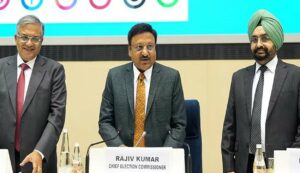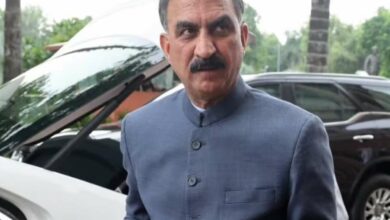The commission announced that polling will be held in two phases on November 20 in Maharashtra and on November 13 in Jharkhand
Election Commission announced single-phase votes in Maharashtra on November 20 and two-phase voting on November 13 and 20 to elect the new Jharkhand legislature, setting the scene for another exciting struggle between the BJP and its allies and their adversaries associated with the Congress party. On November 23, there will be bypolls for 48 assembly seats and 2 Lok Sabha seats, along with counting for both states.

Both parties are interested in winning the twin fights; the BJP wants to consolidate its lead after its surprising victory in Haryana, while Congress and its allies want to recapture the momentum from their impressive LS showing.
The two parliamentary by-elections are in Nanded, Maharashtra, which became vacant with the passing of incumbent MP Vasant Chavan, and Wayanad, Kerala, where Priyanka Gandhi will run for office for the first time. The assembly seat of Kedarnath and the Nanded LS constituency will vote on November 20, while elections for 47 assembly seats and Wayanad will take place on November 13.
Because of ongoing election petitions, bypolls scheduled for Milkipur, in Uttar Pradesh, and Basirhat, in Bengal, were not notified. The present campaign is captivating because to the significant changes in Maharashtra politics since the previous elections, including the separation of Shiv Sena and NCP and Uddhav’s Sena abandoning the BJP to form a coalition with the Congress.
What should have been a conventional incumbent against challenger battle has taken on a harsher edge in Jharkhand as a result of Chief Minister Hemant Soren’s incarceration and stunning return.
“Elections are a democratic festival, and it is expected and encouraged that voters participate enthusiastically. At a press conference to announce the vote timetable, chief election commissioner Rajiv Kumar, accompanied by election commissioners Gyanesh Kumar and S S Sandhu, stated, “We also appeal to the candidates to campaign fearlessly while honoring model code of conduct.”
The BJP made history by winning a third consecutive term in Haryana, and the Congress’s dreams of toppling the government on the basis of what it considered to be a strong anti-incumbency feeling were dashed by the recent assembly votes. Although J&K surveys showed that Congress and the National Conference were winning together, the national party only contributed six seats to the combined 48 seats, meaning that the National Conference was the clear winner.
In the Maharashtra Legislative Assembly elections, the BJP-Shiv Sena-NCP coalition lost ground, obtaining just 17 of the 48 seats in the state, while the alliance of Uddhav Balasaheb Thackeray’s Shiv Sena and Sardar Pawar’s NCP had an outstanding showing, securing 31 seats. This came when the NCP and Shiv Sena broke halfway through the five-year tenure, allowing the BJP-led alliance made up of the rebel groups to overthrow the Thackeray government in 2022.
The BJP intends to improve the situation in Maharashtra and reclaim Jharkhand from the coalition headed by the JMM, which is facing allegations of corruption. BJP won eight of the fourteen Lok Sabha seats in Jharkhand at the earlier this year’s elections, while JMM and the Congress only secured three and two seats, respectively.
In 288 seats, up to 9.6 crore voters in Maharashtra will cast ballots, including 20.9 lakh first-time voters between the ages of 18 and 19 and 1.8 crore voters between the ages of 20 and 29. 2.6 crore voters in Jharkhand will cast ballots in 81 seats, 11.8 lakh of them would be first-time voters.
The vote calendar accounts for the fact that November is jam-packed with festivities, such as Dev Deepawali, Chhath, and Diwali. In order to allow migrant voters from Bihar to finish their Chhath celebrations and associated travel to their hometowns, the Election Commission (EC) arranged for the votes to take place at the end of the second week of November.
Wednesday was specifically picked for both polling days, according to the CEC, since it comes in the midst of the week and would prevent voters from choosing to take a vacation by combining the poll-day holiday with the weekend.
EC has limited the phases in a state deemed a security risk for the second time. The polling commission in Jharkhand, which is impacted by Left-wing extremism, has continued the trend by reducing the number of stages from five in 2019 to only two after concluding the elections in J&K in three phases. This was made possible by the Center’s resolute efforts to combat Left-wing extremism in Jharkhand by freeing the state’s several regions from Maoist control.





